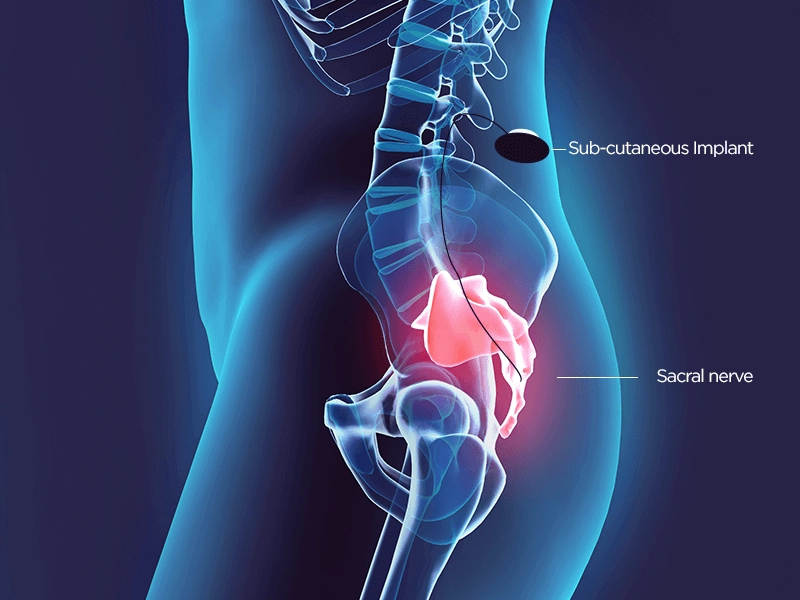Home/Wellness Zone/Sakra Blogs
20th Feb, 2017

Incontinenece – Bowel and Bladder Control Problems
Incontinence problems are emotive issues and can never be considered as a normal part of life at any age. Even though these problems are very common among people of both genders and have a significant impact on the quality of life, most of the case go unreported often due to the following reasons:
Patients feels embarrassed to seek treatment
Sometimes people consider their symptoms to be normal side effects of aging and/or childbirth
Often patients and a large pool of treating doctors are also unaware of the successful treatment options available, apart from medications
Personal hygiene issues arising due to incontinence also lead to profound psychological problems like social isolation and emotional distress.
What is Sacral Neuromudulation (SNM)?
Sacral Neuromodulation (using gentle electric impulses) is an established treatment option gaining popularity for people with bladder and bowel issues.

Sacral Neuromudulation is a technique in which the sacral nerve that controls the bladder, bowel and pelvic floor and the muscles related to their function, is stimulated with mild electrical impulses using a device known as Neurostimulator (like an heart pacemaker). The electrical stimulation modulates nerves that supply the bladder, bowels, urinary & anal sphincters, and the pelvic floor muscles. This enables the person to perceive the sensation of bladder fullness and the desire to empty the bladder, spontaneously and completely. The intensity and frequency of the impulses generated by the neurostimulator can be modified by both the physician and the patient through an external programmer.
How does sacral nerve stimulation work?
The muscles in the pelvic area, such as the pelvic floor, urethral sphincters, bladder and anal sphincter are all controlled by the brain through nerves that run from the sacral area. Sensations such as fullness in the bladder or rectum, are also relayed to the brain via these nerve routes. SNM works by activating or inhibiting these reflexes. This implantable system sends electrical impulses to an area near the sacral nerve to modulate the neural activity that influences the behavior of the pelvic floor, lower urinary track, urinary and anal sphincters, and colon. Unlike oral medications that target the muscular component of bladder control, Sacral Neuromodulation offers control of symptoms through direct modulation of the nerve activity. Besides the local stimulation, neuromodulation also influences the higher centers of bladder control in the brain (known as pontine micturition center).

When is sacral nerve stimulation indicated?
SNM has been a proven treatment modality for bladder control, bowel control problems and persistent pelvic/perineal pain syndromes. Some of the common indications for sacral neuromodulation are:
Urinary urge incontinence and frequency (not stress incontinence):
Bowel (motion) Incontinence
Persistent Perineal / Pelvic pain
It is also worth trying for:
Chronic non-Obstructive Urine retention
Chronic constipation
It is also indicated in patients with chronic urinary retention, voiding dysfunction, bowel dysfunction and chronic pain syndrome. In patients with chronic urinary retention, the only known forms of treatment are Clean Intermittent Self-Catheterization (CISC) or Indwelling Supra-pubic /Transurethral Catheters. Often patients find CISC to be a painful and traumatic process, in such cases, SNM offers to be an effective therapeutic alternative.
Sacral Neuromodulation for Bladder Control
SNM is an innovative and successful therapy for patients with overactive bladder and urinary retention problems for whom conservative treatments have failed. The neuromodulation therapy provides efficient bladder control by addressing the nerve component. In appropriately selected patients, SNM can considerably reduce or even eliminate the symptoms of overactive bladder and urinary retention. Although it must be noted that the therapy is not recommended for patients with a mechanical obstruction like – benign prostatic hypertrophy, cancer or urethral stricture.
The therapy is more appropriate for patients who:
Suffer from the quality of life issues
Experience urge incontinence or urgency/frequency issues
Experience urinary retention without an obstruction
Desire an alternative to medication due to side effects or lack of efficacy
Sacral Neuromodulation for Bowel Control
SNM therapy for bowel control is indicated in patients with chronic fecal incontinence for whom the conservative treatments have not worked well. The therapy is more appropriate for patients who:
Suffer from quality of life issues
Experience chronic fecal incontinence
For both Bowel control and Bladder control therapies, it is very essential to choose the patients properly, such that they fulfill the following criteria:
They must be appropriate candidates for surgery
They should be able to properly operate the system by themselves
They should have received satisfactory results from test stimulation
When is sacral nerve stimulation contraindicated?
SNM is generally contraindicated in the following cases:
Mechanical outlet obstruction or Complete disruption of bladder and bowel sphincter)
Diathermy use (shortwave, microwave, ultrasound)
Inadequate response to test stimulation or inability to operate the device
The safety and efficacy of SNM have still not be established for the following:
Age younger than 16 years
Patients with neurologic conditions such as multiple sclerosis
Your doctor is the best person to discuss if it is still worth undertaking a trial of sacral nerve stimulation to improve symptoms.
When can a Sacral Stimulator be implanted?
Sacral stimulation implant is a non-ablative (not destroying nerves) treatment option that is only completed if the trial stimulation over few days is successful in reducing/resolving the patient’s problems. It is one of the few treatment options where one can try the therapy before committing to full implantation of the stimulator system.

Don’t Be Embarrassed For Something
You Can Get Freedom From!

At Sakra World Hospital we have an experienced Neuromodulation team that can guide patients in achieving good outcomes in reducing their embarrassing bladder and bowel issues.